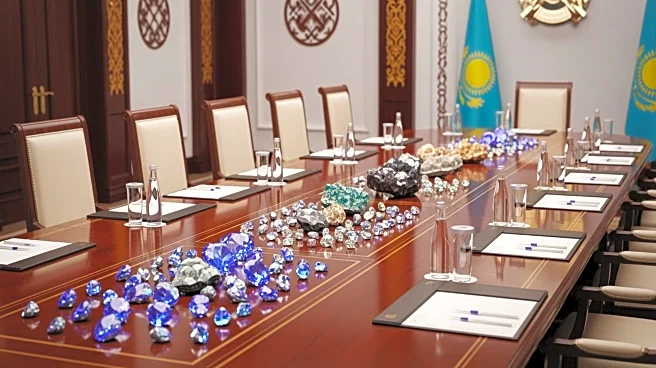What's Happening?
President Donald Trump is hosting leaders from Central Asia in Washington for a high-profile summit focused on mineral diplomacy. This event marks a significant engagement between the United States and
the Central Asian states of Kazakhstan, Kyrgyzstan, Tajikistan, Turkmenistan, and Uzbekistan. These countries are rich in critical minerals and rare earth elements, which are vital to U.S. national security. The summit follows recent mineral deals by the U.S. with countries in the Asia-Pacific region and comes amid trade tensions with China, which dominates the global supply chain for these elements. The Central Asian leaders are seeking to leverage their mineral wealth to strengthen ties with the U.S. and attract foreign investment, while the U.S. aims to diversify its sources of critical minerals away from China.
Why It's Important?
The summit is crucial as it represents a strategic move by the U.S. to reduce its dependency on China for critical minerals, which are essential for various industries, including technology and defense. By engaging with Central Asian countries, the U.S. seeks to establish new partnerships that could provide alternative sources for these minerals. This could potentially shift the balance of power in global mineral supply chains and reduce China's influence. For Central Asian countries, this engagement offers an opportunity to attract U.S. investment, which could boost their economies and help them maintain a balanced foreign policy amidst pressures from neighboring China and Russia.
What's Next?
The summit is expected to result in discussions on energy logistics, infrastructure investments, and technology transfer. Central Asian leaders are likely to push for U.S. investment in their mineral sectors and infrastructure projects, such as the Middle Corridor trade route. The U.S. may also explore opportunities to access untapped mineral deposits in the region. Human rights issues, although not a primary focus, may also be addressed by advocacy groups urging for their inclusion in the agenda. The outcomes of this summit could influence future U.S. foreign policy and economic strategies in the region.
Beyond the Headlines
The summit highlights the geopolitical significance of mineral resources in international relations. It underscores the U.S.'s strategic interest in diversifying its supply chains and reducing reliance on China. The engagement with Central Asia also reflects a broader U.S. strategy to counterbalance Chinese and Russian influence in the region. Additionally, the focus on minerals could lead to increased environmental scrutiny, as the processing of these elements is often associated with significant ecological impacts.












